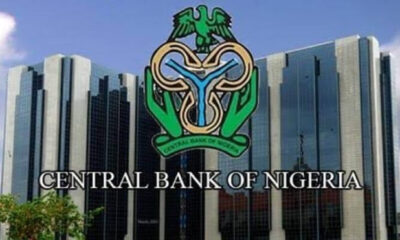News
Bill For Single Term Of Six Years For CBN Gov, Others Scale Second Reading In Senate

A bill that seeks to provide for a single non-renewable term of 6 years for the governor and the deputy governors of Central bank of Nigeria, CBN, has scaled second reading in the Senate.
It also limited temporary advances to the federal government as Ways and Means by the apex bank.
According to the Senate, the six-year non-renewable term is the practice adopted by many apex banks, such as the US Federal Reserve and the European Central Bank where their chief executive officers serve only one non-renewable term.
The Red chamber added that evidence had shown that a single term for members of the executive and Board members of central banks helps to reduce political influence on monetary policy decisions and the time inconsistency problem associated with non-independent central banks.
Disturbed by the hardship and hazards Nigerians went through, following the naira redesign policy of the Central Bank of Nigeria, CBN, the bill also seeks to ensure that the apex bank gives reasonable notice of at least one calendar year of its intention to replace the existing legal tender has scaled second reading in the Senate.
The bill also limited temporary advances to the federal government as Ways and Means by the Central Bank of Nigeria, CBN.
According to the bill, the entire programme should last at least two years from the date of the announcement of its intention, as throughout the duration of the programme, both the old and new currency notes and coins are expected to serve as legal tender simultaneously.
In the proposed bill, the withdrawal of the old legal tender should be carried out in phases and in a manner that does not cause any distortion to economic activities and that the bank should be in possession of sufficient new currency (not less than 70 per cent of the old stock of currency to be withdrawn) before embarking on such a programme.
The bill also proposes that the CBN Board Committees should be headed by non-executive directors, instead of deputy governors.
Titled a ‘’Bill for an Act to Amend the Central Bank of Nigeria Act, 2007 to strengthen the Bank, and for other related matters thereto, 2024 (SB. 325)’’, the document was sponsored by Senator Adetokunbo Abiru, APC, Lagos East, and co- sponsored by 41 other senators.
In the proposed bill, there is a limit to temporary advances to the federal government by the CBN as Ways and Means not exceeding 10%.
“The current CBN Act empowers the CBN to grant temporary advances to the federal government to finance unexpected shortfall in budget revenue.
‘’The advance is not to exceed five per cent of the previous year’s actual revenue of the federal government and it is to be paid back at the end of the financial year it was granted.
‘’In order to firm up this provision and prevent a repeat of the recent experience in which the bank’s Ways and Means have fueled inflation and significantly distorted economic management, the bill proposes the following:
‘’Any such direct advance to the government should not exceed 10% of average government actual revenues during the preceding three years. For the purpose of determining government’s actual government revenue, proceeds from asset sales shall be excluded to avoid capturing revenues from exceptional items.”
In his presentation of the lead debate on the general principles of the bill, Senator Abiru said: “The mandate of the Central Bank of Nigeria is derived from the 1958 Act of Parliament as amended in 1991,1993, 1997, 1998 and 2007.
‘’The current Act of 2007, which charges the bank with the overall control and administration of the monetary and financial sector policies of the federal government has not been amended for over 16 years, despite growing changes to the bank’s balance sheet as well as challenges in monetary policy implementation, occasioned by fiscal dominance and the rapidly changing financial landscape.
The proposed amendments are, therefore, aimed at strengthening the bank to discharge its primary mandate of maintaining monetary and price stability in support of government’s economic growth objectives as well as align its governance mechanisms with global best practices.
‘’The current Act made no provision for coordination of monetary and fiscal policies which is the reason monetary policies of the bank often diverge from fiscal policies to the detriment of the economy.
‘’To this end, the bill introduces for the purpose of co-ordination of the monetary, fiscal and trade policies, a coordinating committee for monetary and fiscal policies.’’
Credit: Vangaurd








